The 10 best AI tools for filmmakers include Adobe Sensei and Runway ML. These tools enhance creativity and streamline post-production tasks.
Filmmakers continually seek innovative ways to optimize their creative process. AI tools offer powerful solutions to enhance storytelling, streamline editing, and improve visual effects. Adobe Sensei integrates with Adobe’s suite, providing smart editing features and automated tagging. Runway ML empowers filmmakers with real-time video editing and special effects generation.
These tools save time and elevate the quality of film projects. These AI-driven platforms empower filmmakers to enhance their creativity and simplify complex tasks. With the right AI tools, filmmakers can focus more on their artistic vision and less on repetitive tasks.
Table of Contents
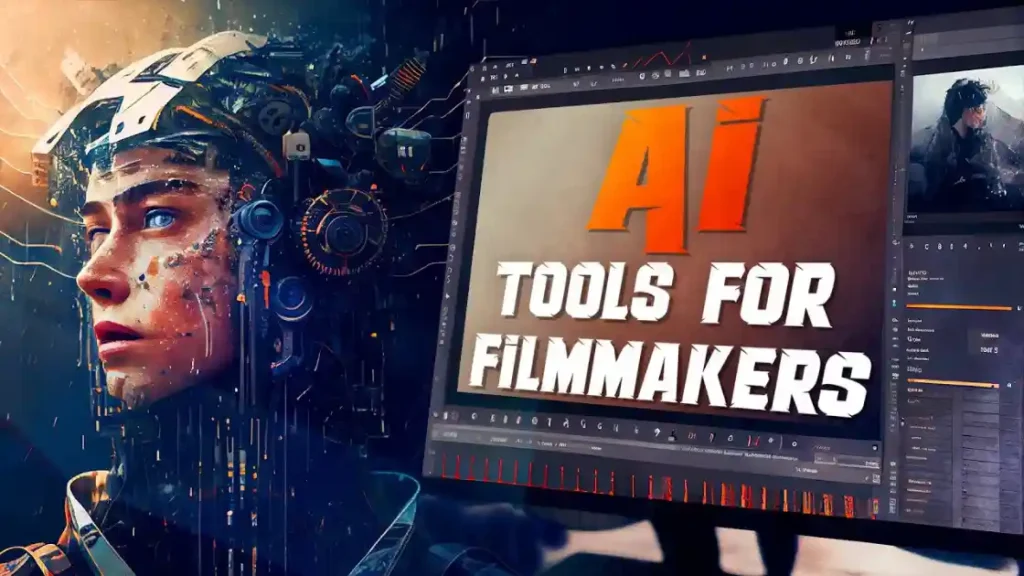
Revolutionizing Filmmaking
AI is changing the way filmmakers work. Many tasks are being streamlined, making them faster and more efficient. From editing to extra effects, AI tools expand options.
Now filmmakers may edit with AI. AI-powered editing tools can clip footage, select the greatest parts, and make film rough drafts. This frees up time and lets filmmakers focus on creativity.
Visual effects are also increasing with AI. AI-generated photography and deepfake technology make dazzling graphics easier. These tools can help filmmakers realize their ideas without pricey equipment or large teams.
Another field where AI is having an impact is sound design. AI can reduce background noise, clean audio, and produce sound effects. Post-production runs more smoothly and quickly.
AI is also utilized for scriptwriting. Some AI programs develop narrative ideas and dialogue. Although they can’t replace a writer, they can inspire fresh ideas and improve writing.
AI is making filmmaking easier, faster, and more accessible for all creators.
AI in Modern Cinema
AI is reshaping modern cinema in unprecedented ways. Many filmmakers use AI to automate tedious tasks, allowing them to focus on creativity. AI helps with color grading, sound design, and visual effects.
Some advanced AI tools assist in generating realistic CGI characters. These characters are difficult to distinguish from real actors. AI also aids in predictive analytics, helping to determine what audiences want to see.
Benefits of AI Tools
AI tools offer numerous benefits for filmmakers. Here are some key advantages:
- Speed: AI speeds up the editing and post-production process.
- Cost-Effective: Reduces the need for large crews and resources.
- Accuracy: AI tools provide precise editing and color grading.
- Creativity: Allows filmmakers to explore new creative avenues.
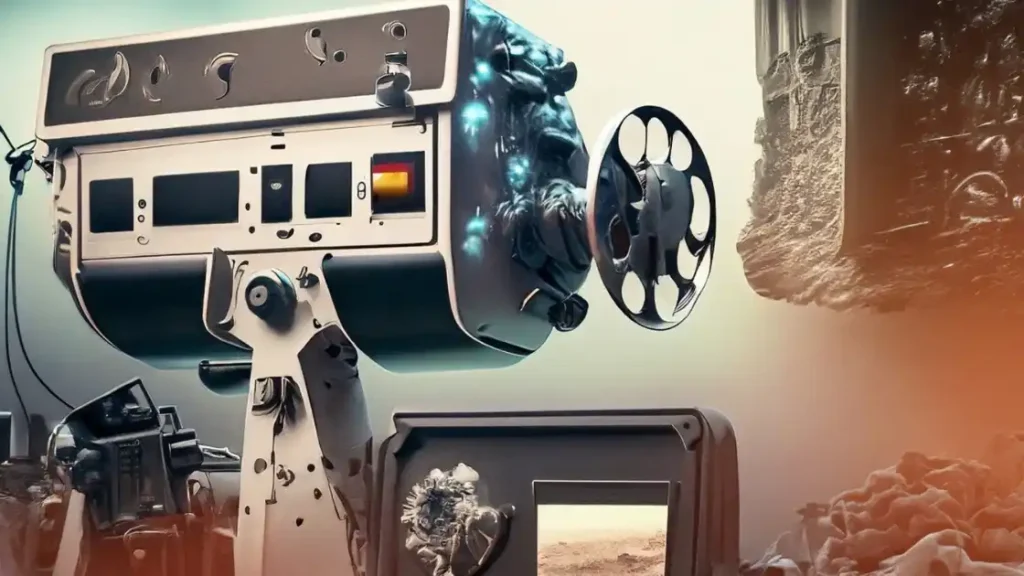
Scriptwriting Tools
Scriptwriting is the backbone of any film. A strong script can make a movie unforgettable. AI tools have revolutionized scriptwriting, making it easier and more efficient. These tools help filmmakers craft better stories and develop engaging plots.
Automated Storytelling
Automated storytelling tools assist in generating story ideas. They use AI algorithms to create unique narratives. These tools can suggest characters, settings, and conflicts. Filmmakers can quickly draft outlines and scripts.
Here are some top automated storytelling tools:
-
-
ScriptBook
ScriptBook uses AI to analyze scripts, offering feedback on structure, pacing, character development, and market potential. It helps writers and producers improve dialogue, tone, and genre alignment, making it easier to polish scripts before approaching buyers or producers. -
Plotagon
Plotagon lets users create animated stories by automatically converting scripts into animated videos. With a drag-and-drop interface, users can customize characters, settings, and voiceovers, making it ideal for beginners and storytellers looking to create quick animations without animation skills. -
WriterDuet
WriterDuet is a cloud-based screenwriting tool for real-time collaboration. Multiple users can work on a script simultaneously, with automatic syncing, version history, and easy export options, making it popular for both professional and remote screenwriters.
-
Automated storytelling tools save time and spark creativity. They help writers focus on refining their ideas.
Plot Development Assistance
Plot development tools enhance the structure of a story. They guide writers through plot points and character arcs. These tools ensure the story flows logically and keeps the audience engaged.
Some top plot development tools are listed below:
- Dramatica Pro: Dramatica Pro’s step-by-step guidance helps writers create solid stories. Character motivations, story structure, and themes are revealed, making it excellent for balanced storytelling. The tool simplifies complex plots and explains story connections.
- Final Draft: Film and TV professionals utilize Final Draft for screenplay formatting. The outlining, scene navigation, and collaborative features ensure your script matches industry standards. The story development elements help writers plot and track character arcs.
- Scrivener: This adaptable writing tool manages difficult tasks like novels and screenplays. It organizes plotlines, characters, and notes, making scene and section changes easy. Detail-oriented authors will love its configurable templates and study library.
Plot development assistance tools improve the story’s coherence. They help in crafting compelling and well-structured plots.
Pre-production Planning
- StudioBinder
StudioBinder is a powerful tool for film production management. Automatic call sheet production saves time and reduces errors. Teams can easily monitor significant dates and activities with the tool’s calendar integration. Conflict detection in StudioBinder instantly identifies scheduling overlaps and clashes, keeping production on pace. - Movie Magic Scheduling
It is a comprehensive scheduling tool used in the film industry. It excels in script breakdowns, helping users analyze and manage production based on script needs. Digital stripboards simplify shooting schedule management. The day-out-of-days tracking function helps determine actor availability and shooting days, allowing effective production planning and collaboration.
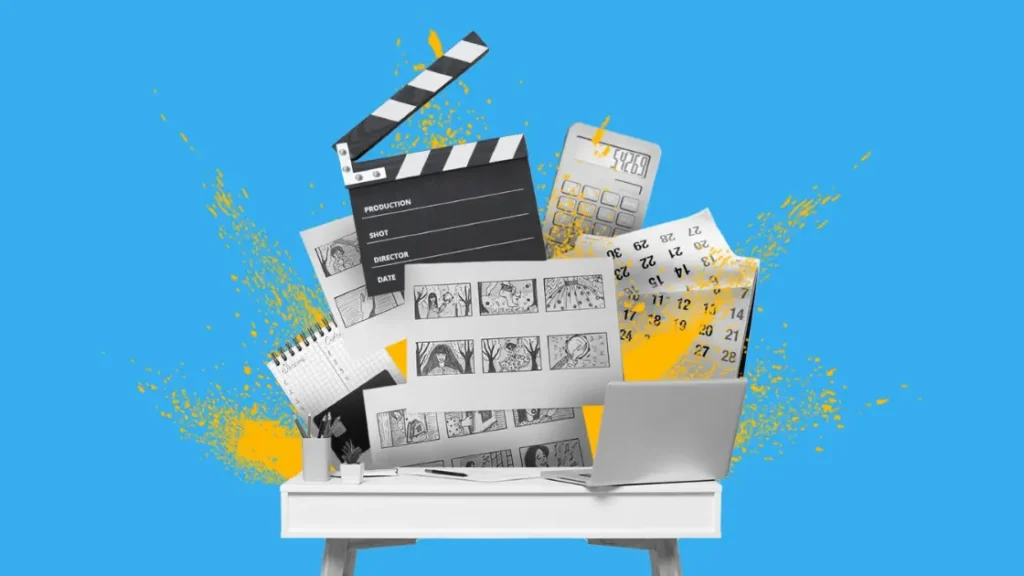
Casting Assistance
Casting assistance is a crucial part of the filmmaking process. AI tools make it easier and faster to find the right talent. With these tools, filmmakers can conduct virtual auditions and match talent efficiently.
Virtual Auditions
With AI, virtual auditions have become simple and effective. Actors can submit their auditions online. This saves time and costs associated with travel and venue bookings. Filmmakers can review these auditions at their convenience.
AI tools also analyze audition tapes for key performance metrics. This helps in identifying the best fit for the role quickly. The use of AI in virtual auditions ensures a more streamlined casting process. It also broadens the talent pool by removing geographic limitations.
Talent Matching
AI tools excel in talent matching. They analyze actors’ profiles and match them with suitable roles. This is based on various criteria like acting skills, experience, and physical attributes.
Some tools even use facial recognition to match actors to characters. This helps in finding the perfect fit for the role. AI-driven talent matching ensures that filmmakers get the best possible actors for their projects.
These tools also keep a database of actors and their past performances. Filmmakers can refer to this database for future projects. This makes the casting process more efficient and effective.
Visual Effects
Visual effects (VFX) are crucial in filmmaking. They bring imagination to life. With advancements in AI, VFX have become more accessible and efficient. Here are the best AI tools that can revolutionize your VFX work.
AI-generated Imagery
AI-generated imagery creates stunning visual effects with minimal effort. These tools can generate realistic images, scenes, and even characters. Filmmakers can save time and resources while achieving high-quality results.
-
DeepArt
DeepArt uses deep learning algorithms to transform photos into artwork. By applying different artistic styles, it converts your photos into images that resemble famous painting techniques, such as those of Van Gogh or Picasso. -
RunwayML
RunwayML offers a wide range of AI models for various creative tasks, including image generation. It allows users to access cutting-edge AI models for generating, editing, and manipulating images, videos, and other media in creative ways. -
Artbreeder
Artbreeder is a platform that enables users to combine and blend images to create new and unique visuals. It leverages generative adversarial networks (GANs) to manipulate and merge images, allowing for endless creative possibilities, especially in art and character design.
Real-time Rendering
Real-time rendering revolutionizes the field of visual effects. It allows filmmakers to see visual effects instantly. This speeds up the production process and enhances creativity.
-
Unreal Engine
Offers real-time rendering for high-quality visuals, widely used in games, film, and interactive media. It also supports VR/AR development, making it versatile for various applications. -
Unity
Provides real-time rendering and a powerful toolset for creating VFX, popular in game development and film. Its cross-platform support allows developers to reach multiple devices and platforms with ease. -
Blender
Open-source 3D tool with strong real-time rendering capabilities, used for modeling, animation, and rendering. It also features a large community and many plugins to enhance its functionality.
Editing Software
Editing software is the heart of film production. AI tools make this process faster and smarter. They help filmmakers craft perfect scenes with ease.
Automated Editing
Automated editing tools can save filmmakers countless hours. These tools use AI to cut and arrange footage. They identify the best shots and sequences.
A popular tool for automated editing is Adobe Premiere Pro’s Sensei. It uses machine learning to understand the flow of your story. Magisto is another tool that edits your videos automatically. It is perfect for quick projects.
- Adobe Premiere Pro’s Sensei
Adobe Premiere Pro’s Sensei Uses AI for efficient cutting, scene detection, and shot layout. Analyzing footage and recommending content- and context-based changes speed up editing. - Magisto
Magisto automates video creation with AI. It utilizes AI to evaluate film, choose the best scenes, and tell a compelling tale, making it easy to make videos without any editing.
Scene Transitioning
Scene transitioning is vital in filmmaking. AI tools help create smooth transitions. These tools analyze the context of scenes to choose the best transition effects.
Filmora9 offers an AI-driven scene transition feature. It makes switching between scenes seamless. HitFilm Express also provides intelligent scene transitioning. It ensures your film flows naturally from one scene to the next.
- Filmora9
Filmora9 has AI-driven scene transitions and context analysis. The AI analyzes footage to suggest smooth transitions and maintain movie flow, making editing faster. - Movie Express
Intelligent transitions in HitFilm Express make clips flow naturally. It employs AI to enhance transitions and visuals.
Sound Design
Sound design is a crucial aspect of filmmaking. It has the power to significantly impact the audience’s experience. With the rise of AI, sound design has reached new heights. AI tools can make audio mixing and sound effect generation easier and more efficient.
AI in Audio Mixing
AI in audio mixing helps filmmakers achieve professional-quality sound. These tools balance audio levels, reduce noise, and enhance clarity. Here are some top AI tools for audio mixing:
- iZotope Neutron: This tool uses AI to mix audio tracks. It analyzes your audio and suggests the best settings.
- LANDR: LANDR offers AI-driven mastering and mixing services. It ensures your audio sounds excellent on all devices.
- Adobe Audition: Adobe Audition includes AI features for noise reduction and audio enhancement.
Sound Effect Generation
Creating sound effects can be time-consuming. AI tools can generate high-quality sound effects quickly. These tools allow filmmakers to focus on creativity. Here are some AI tools for sound effect generation:
- AIVA: This AI generates custom sound effects based on your input. It saves time and enhances creativity.
- Amper Music: Amper Music uses AI to create soundscapes and effects. It offers a wide range of options to suit any film.
- Boom Library: Boom Library’s AI tool helps create realistic sound effects. It’s perfect for both beginners and experts.
Using these AI tools, filmmakers can enhance their sound design. They provide high-quality audio mixing and sound effect generation. This ensures a professional and engaging film experience.
Marketing and Distribution
Marketing and distribution are critical for a film’s success. AI tools can streamline these processes, making them more effective and efficient. These tools help filmmakers target their audience and create powerful campaigns. Let’s dive into how AI can revolutionize marketing and distribution for filmmakers.
Audience Targeting
Knowing your audience is crucial. AI tools can analyze vast amounts of data. They identify patterns and preferences. This helps filmmakers understand who their audience is. AI tools can segment audiences based on demographics, interests, and behaviors. This ensures marketing efforts are precise and effective.
-
Audience Insights
Audience Insights analyzes social media data to provide valuable information about audience demographics, behaviors, and engagement. Tools like Sprout Social and Hootsuite Insights use AI to track audience sentiment and engagement, helping marketers tailor their content to target the right audience. -
Behavior Analytics
Behavior Analytics tracks viewer habits, such as how users interact with content and what they watch. Tools like Google Analytics and Hotjar leverage AI to analyze user behavior, providing insights into how to optimize website design and content for better user experience.
AI-driven campaigns
Creating a marketing campaign can be challenging. AI tools make this process easier. They can generate content, schedule posts, and track performance. AI-driven campaigns are data-backed. This means they are more likely to succeed.
-
Content Creation
AI tools can assist in writing engaging posts by analyzing trends, keywords, and audience preferences. Tools like Copy.ai and Jasper use AI to generate creative and relevant content quickly. -
Scheduling
AI-powered tools can schedule posts at optimal times based on audience activity and engagement patterns. Tools like Buffer and Hootsuite use AI to determine the best times to post on social media for maximum reach and engagement. -
Analytics
AI tools can track the performance of your social media campaigns by analyzing engagement, reach, and conversion rates. Sprout Social and Google Analytics provide insights into how well your campaigns are performing and help you adjust your strategy.
Using AI tools ensures your film reaches the right audience. It makes your marketing efforts more efficient and impactful.
Chart Comparing Popular Filmmaking AI Tools
Here is a comparison table of some popular AI tools used in filmmaking:
| Tool | Features | Benefits |
|---|
| Adobe Sensei | AI-powered editing, scene detection, adjustments. | Saves time, enhances creativity, automates tasks. |
| Runway ML | AI models for video/image generation and editing. | Easy integration, powerful creative tools. |
| ScriptBook | AI script analysis and predictions. | Helps improve scripts, makes data-driven decisions. |
| Dramatica Pro | Storytelling and plot structure assistance. | Improves story depth, enhances narrative. |
| StudioBinder | Production scheduling, call sheet automation. | Streamlines management, reduces scheduling errors. |
| Blender | 3D modeling, animation, and rendering tools. | Free, professional-grade 3D tools. |
| Filmora9 | AI-driven video editing, smart transitions. | Easy editing saves time and provides creative tools. |
| Boom Library | Sound effects for video production. | High-quality audio, enhances production value. |
| Sprout Social | Social media management and analytics. | Optimizes strategy, tracks engagement. |
| Hotjar | Heatmaps, session recordings, behavior analytics. | Improves user experience, boosts conversion rates. |
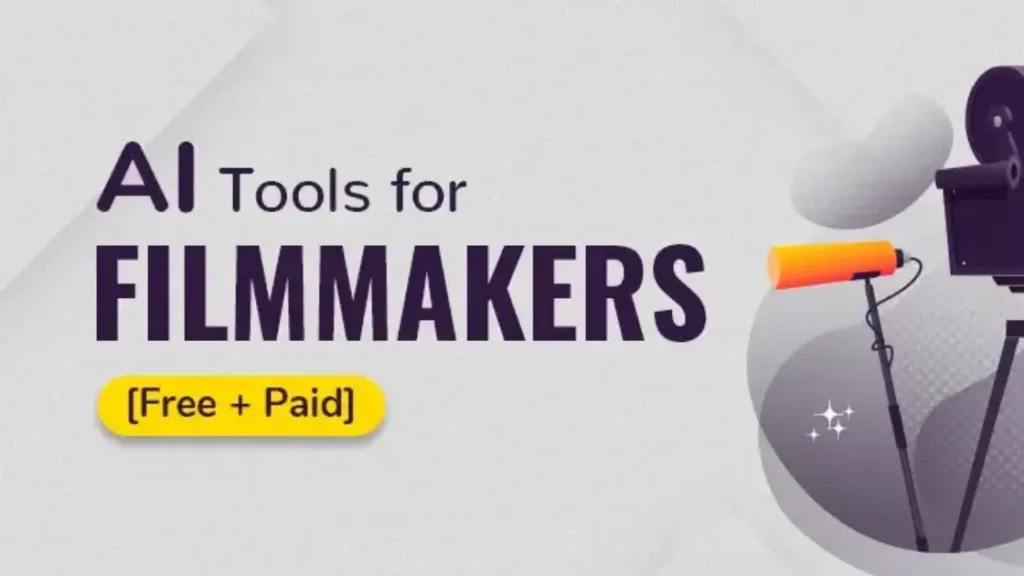
Future of AI in Filmmaking
Artificial intelligence is transforming the world of filmmaking. It brings new possibilities and efficiencies to the industry. AI tools help filmmakers create stunning visuals, improve sound, and streamline editing. Let’s explore how AI will shape the future of filmmaking.
Upcoming Innovations
AI will revolutionize scriptwriting. Tools can suggest plot twists, character development, and dialogue improvements. AI can analyze thousands of scripts to find what works best.
In visual effects, AI will create more realistic animations. Machines will handle complex scenes faster than humans. AI-generated landscapes and characters will look lifelike. AI will also help in color grading. It ensures consistent tones throughout the film.
Sound editing will benefit too. AI can clean audio and match sound effects perfectly. AI-powered tools will speed up the editing process. Filmmakers can focus on creative decisions.
Ethical Considerations
AI in filmmaking raises ethical questions. One concern is job displacement. Automation might replace some roles. It’s crucial to balance AI use with human jobs.
Another issue is data privacy. AI tools need large datasets. Filmmakers must ensure data is used responsibly. Consent and security are important.
AI-generated content also poses authenticity challenges. Viewers might struggle to distinguish human-made from machine-made work. Filmmakers should be transparent about AI use in their projects.
Frequently Asked Questions
What Are the Best AI Tools for Filmmakers?
Several AI tools help filmmakers enhance their projects. Popular ones include Adobe Premiere Pro, RunwayML, and Magisto. These tools streamline video editing, special effects, and even scriptwriting. They save time and boost creativity.
How Does AI Improve Video Editing?
AI automates tedious video editing tasks. It can cut scenes, add effects, and color-correct videos efficiently. This allows filmmakers to focus on creative aspects, improving overall productivity and video quality.
Can AI Tools Help with Scriptwriting?
Yes, AI tools assist in scriptwriting. Tools like ScriptBook analyze scripts and predict audience reactions. They help create engaging and marketable screenplays, making the scriptwriting process faster and more efficient.
Are AI Tools Cost-effective for Filmmakers?
AI tools can be cost-effective. They reduce the need for multiple software and manual labor. By automating repetitive tasks, filmmakers save time and money, making the production process more efficient and budget-friendly.
Conclusion
Choosing the right AI tools can greatly enhance your filmmaking process. From editing to special effects, these tools offer incredible support. Embrace these technologies to streamline your workflow and elevate your creative vision. Stay ahead in the industry by integrating these top AI tools into your projects.
Happy filmmaking!

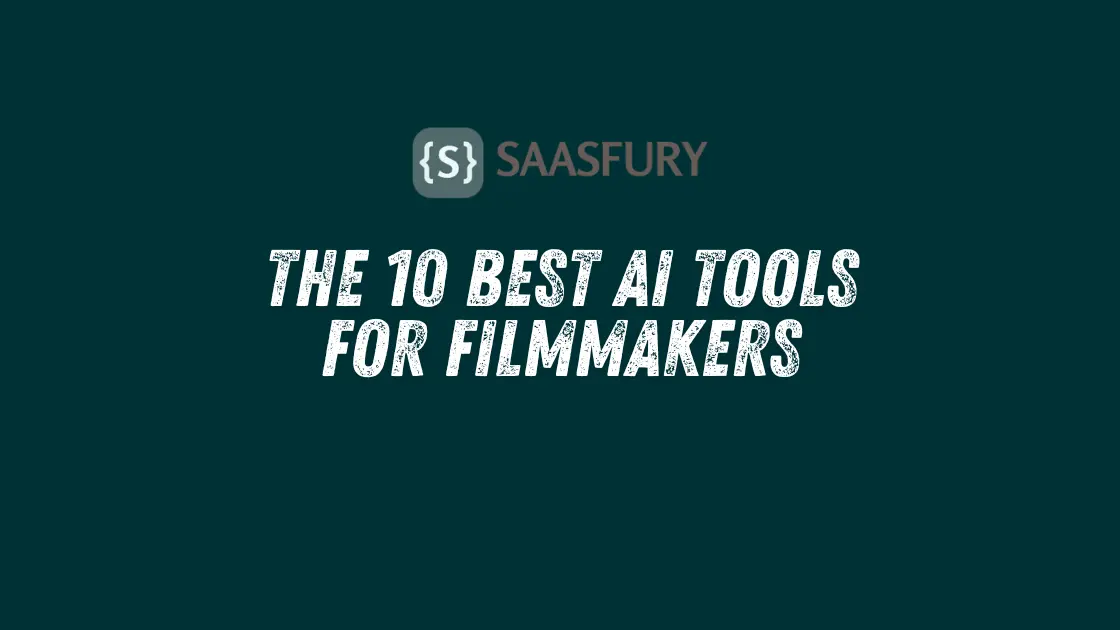
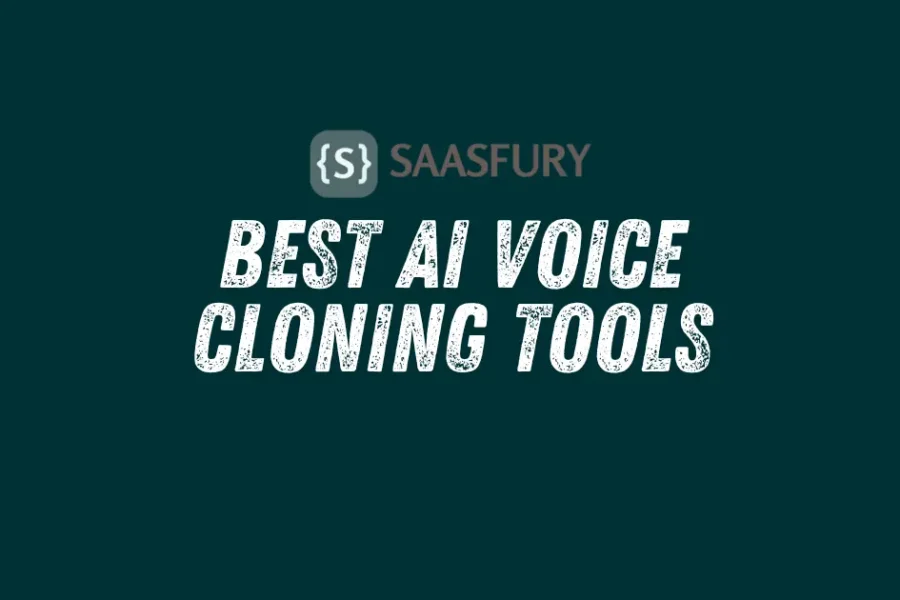
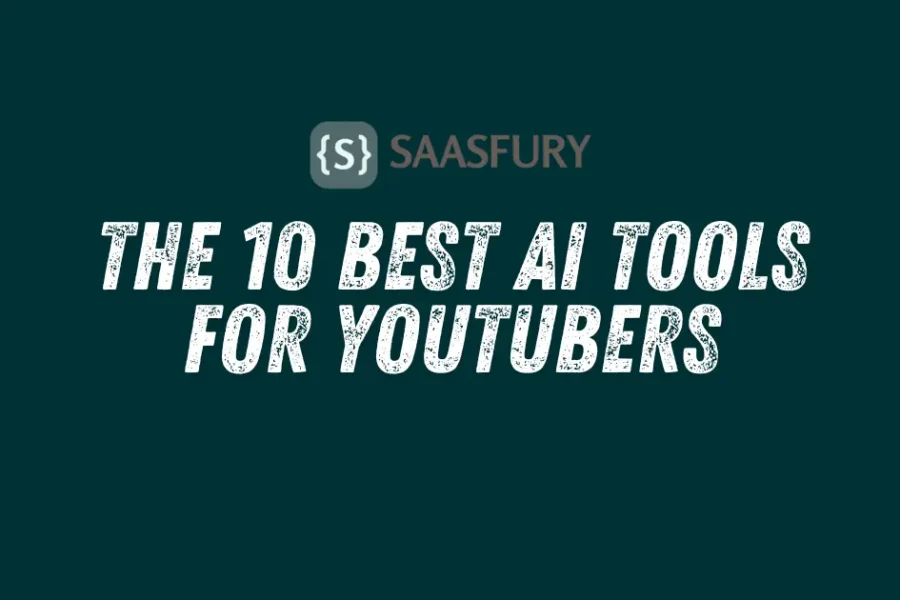

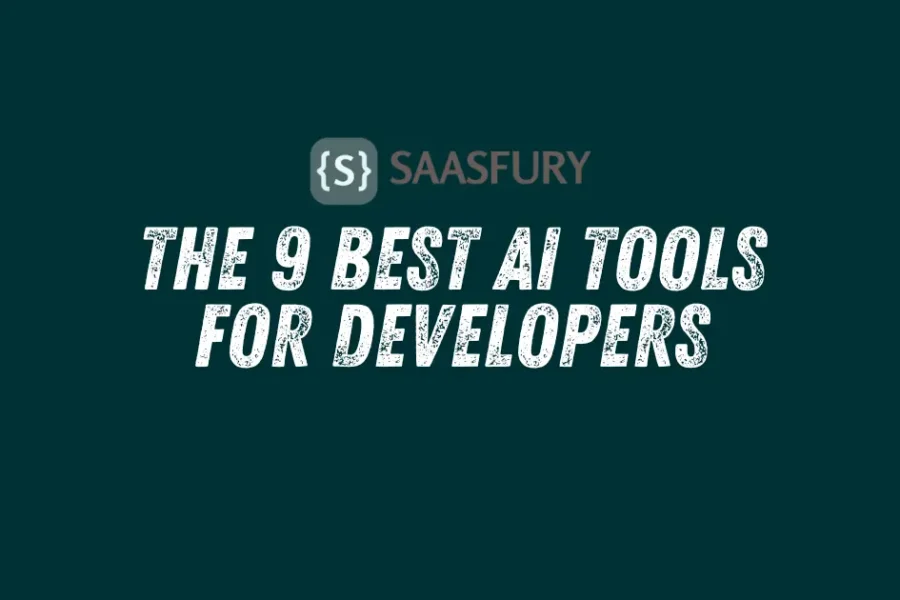
Leave a Comment